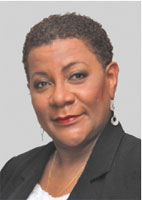|
November 2017

Issue Home >>
|

 

COSTAATT was established in October 2000 as a multi-campus community college. While other Caribbean islands had adapted and introduced the north American model into their higher education systems since the 1960s, Trinidad and Tobago had relied on The UWI and a range of technical institutes to meet human resource development needs. Almost two decades and 15,000 graduates later, there can be no denying the transformative impact of COSTAATT on the national educational landscape. Understanding the role and value of the community college in the creation of a diversified, integrated and responsive higher education system is still however, a work in progress,
In the USA, community colleges account for over 45% of students pursuing higher education studies. Affordability, responsiveness and social value are three hallmarks of the community college model adopted and adapted by countries as diverse as South Africa, Chile and Japan. Known as “democracy’s college” in the US, community colleges are a major engine for promoting social equity by ensuring that all citizens who have the aptitude for tertiary level studies are provided with alternate pathways and multiple opportunities to realise their potential, enhance socio-economic mobility and improve their quality of life.
Parents and self-financing adults are able to lower the cost of obtaining a bachelor’s degree by enrolling in their local community college and completing an associate degree which, through articulation and transfer agreements with universities, can count for up to two years of a four-year bachelor’s degree programme. Agreements between community colleges and universities enable universities to reduce programme delivery costs for undergraduate education and focus more funding and resources on strengthening post-graduate studies and research.
Responsiveness is perhaps the most valuable asset that community colleges bring to a nation’s higher education agenda. Their comprehensive mission empowers them to offer a wide range of programmes, including career education programmes for direct employment after graduation, transfer programmes that articulate with bachelor’s degrees, community education programmes and services which respond to specific needs of the community where the campus is located, professional education and continuing education, and customised training which is often done in consultation and collaboration with private sector firms and state agencies who need to re-skill or upskill their employees. For students, the associate degree enhances their employability by combining rigorous technical-vocational training with a general education component that addresses the soft skills so in demand by employers. Community colleges are critical enablers for students who, for diverse and valid reasons have not attained the required subjects to pursue tertiary level studies, a second chance at tertiary education access and success. At COSTAATT, our signature developmental education programme, COMPASS, has been the decisive factor in helping the thousands of students who annually fail to achieve a full CSEC pass acquire the necessary academic foundations to pursue the career of their choice. At the national and community level, the College has a record of designing and delivering programmes to meet specific needs and this has ensured the institution’s continued relevance and viability, even in challenging economic circumstances.
As a nation, we have been successful in achieving a 65% participation rate in tertiary education and can boast of having a more diverse range of public and private tertiary education providers. Each institution is committed to its mission and continued growth but the long-held goal of an integrated and efficient national education system that facilitates seamless movement for students from one level to the other is still to be achieved. As we look forward to celebrating our 20th anniversary in 2020, COSTAATT is resolved to creating the types of linkages that will bring us closer to achieving that goal.
Dr. Gillian Paul is President of the College of Science, Technology and Applied Arts of Trinidad and Tobago (COSTAATT).
EDITORIAL TEAM
Campus Principal: Professor Brian Copeland
Director of Marketing and Communications: Dr. Dawn-Marie De
Four-Gill
Editor: Vaneisa Baksh (Email: vaneisa.baksh@sta.uwi.edu )
Contact us:
The UWI Marketing and Communications Office
Tel: (868) 662-2002 exts. 82013, 83997
Email: uwitoday@sta.uwi.edu
|





